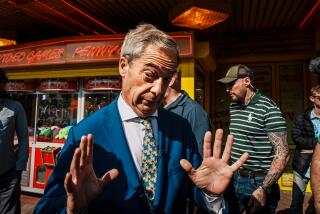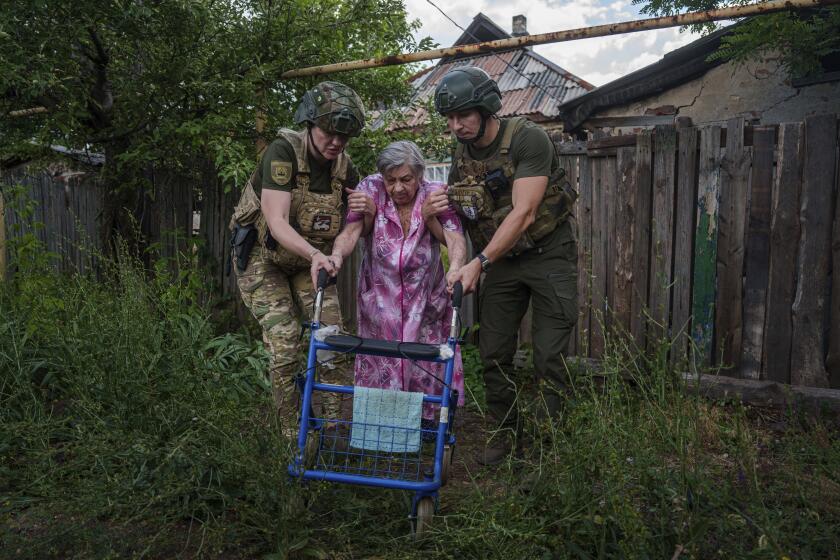Gorbachev Says Soviet Economic Isolation to End
Seeking capitalist support for his efforts to overhaul Soviet communism, Mikhail S. Gorbachev told the leaders of the world’s seven leading industrial democracies Saturday that he plans to bring his country into “full and entire participation in the world economy.”
The Soviet president said he intends to reverse 71 years of economic isolation. “The rest of the world can only gain from the opening to the world economy of a market such as that of the Soviet Union,” he said.
Gorbachev’s message, sent in a letter to French President Francois Mitterrand in his capacity as host of this year’s economic summit, drew immediate, if cautious, praise from the seven summit leaders.
‘Totally Unexpected’ Message
French spokesman Hubert Vedrine said the “totally unexpected” message from Moscow dominated the leaders’ dinner Saturday. “If there was a common element of reaction, it was that if Gorbachev’s initiative was inspired by the desire to insert the Soviet Union progressively into the world economy, that is a good thing,” he said.
White House spokesman Marlin Fitzwater said that President Bush and his aides had not had time to analyze the letter. But he added, “We generally found it positive and supportive.”
“It is another demonstration of Gorbachev’s conceptual boldness,” a senior White House official said admiringly. “It is impossible to imagine the Soviet bureaucracy doing something like this.”
A Canadian diplomat said that the seven leaders were in the middle of a long discussion of Third World debt Saturday afternoon when Mitterrand, an enigmatic smile playing across his face, interrupted.
“I have just received a letter from Gorbachev,” the French president said. “I haven’t read it yet. Let’s see. Look, it’s 6 1/2 pages long. He’s making some general propositions.”
Mitterrand then skimmed through the letter, in French, and promised his impatient colleagues that he would give them all photocopies.
His spokesman, Vedrine, released the text to the press.
Policy of Participation
“Our perestroika is inseparable from the policy of full and complete participation in the world economy,” Gorbachev said in the letter, referring to his campaign to restructure the Soviet system.
“Multilateral East-West cooperation on global economic problems is clearly far behind the development of bilateral and regional links,” he added. “This state of things does not seem justified in the light of the weight of our states in the world economy.”
He said the historical barriers between the capitalist and communist economic systems are being dismantled and called for a new effort “to find the beginning of a common economic language, to proceed to a reciprocal exchange of information.”
Senior U.S. officials said Gorbachev’s message was an encouraging sign of his interest in deeper ties with the West. But they emphasized, as one said, that “there are a lot of steps between here and there.”
A Historic Change
If Gorbachev follows through on his intention to bring the Soviet Union into the world economy, it would constitute a historic change in the Kremlin’s basic policies. Soviet Communist leaders from V. I. Lenin, who led the 1917 Bolshevik Revolution, have attempted to insulate their country’s economy from what they saw as the pernicious influence of the capitalist West.
Gorbachev now hopes to revitalize Soviet communism by adopting some of the ways of capitalism. His call for a “common economic language,” for example, suggested a possible new Soviet bid to join the International Monetary Fund, which Josef Stalin spurned when it was formed after World War II.
But such a reorientation of Soviet international trade and finance would also require vast changes in the way the Communist giant runs its domestic economy--changes well beyond anything yet attempted in the current reform campaign.
U.S. officials said the basic prerequisites for full participation in the world economy would include opening Soviet markets to both exports and investments, switching from a system of prices fixed by the state to a free market and opening the Soviet currency, the ruble, to free exchange.
“He may want to be the eighth man at the (summit) table,” a U.S. official said of Gorbachev, “but it’s going to be difficult if he hasn’t got a convertible currency.”
Slow-Moving Reforms
But Gorbachev, while signaling that such changes are coming, has moved slowly on concrete economic reforms--especially price reforms, which would raise prices paid by Soviet consumers for products that are now subsidized by the government.
One official suggested that Gorbachev’s letter may have been an attempt to fish for increased economic development assistance without making specific commitments to difficult internal reforms.
Another suggested a possible political motive. “Gorbachev needs to maintain the world’s attention for his own domestic reasons, and here George Bush has just had a successful trip through Eastern Europe and a successful summit meeting,” he said. “This was a way to refocus world attention back on Moscow.”
Nevertheless, said the first official: “It can be read as a response to what President Bush has been saying about being ready to integrate the Soviet Union into the world economy. He seems to be saying, ‘Let’s do it.’ ”
The next step, the second official said, should be for the West to devise specific requirements for Gorbachev--to suggest the concrete steps he should take next. “In a sense, we have him in a vulnerable position,” he said. “He’s made these promises, and we can legitimately ask him to fulfill them.”
Question of How Far to Go
But so far, the Bush Administration has been divided internally over how far to go in Gorbachev’s direction. Some officials, especially at the State Department, have suggested that Bush might even offer some of the same forms of economic help to the Soviet Union that he did last week to Poland and Hungary: aid to private enterprise, insurance for U.S. private investments and trade concessions.
But Brent Scowcroft, Bush’s national security adviser, said this week that he believes any such moves are still premature.
“For years, the Soviet Union isolated itself economically from the West because it felt we would infiltrate their system and subvert it,” one official said. “Now they’re inviting us in, and we ought to take them up on it.”
Times staff writer Rone Tempest contributed to this story.
More to Read
Start your day right
Sign up for Essential California for news, features and recommendations from the L.A. Times and beyond in your inbox six days a week.
You may occasionally receive promotional content from the Los Angeles Times.







